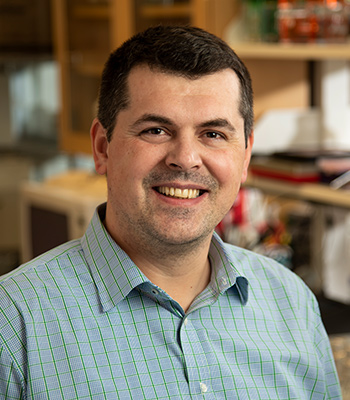Two new faculty in the Department of Medicine are among 12 in the School of Medicine who were recruited within the last year as part of the Translating Duke Health (TDH) initiative.
These new faculty members—representing a spectrum of career stages—were recruited to Duke because of their expertise in numerous fields including transplantation, neurosurgery, gene therapy, HIV, and more.
Known as Translating Duke Health Scholars, they will work with faculty across the School to advance research aimed at addressing major health challenges in five key areas: cardiovascular disease, children’s health, brain metastasis, brain resilience, and immunology. These hires represent the first wave of a large recruitment effort that will continue as the TDH initiative moves into its second year. Read more on the MedSchool blog.
Department of Medicine TDH Scholars
Mihai Azoitei, PhD
Assistant Professor of Medicine
Duke Human Vaccine Institute
 After many years of research, the field of HIV vaccine design is at a point where promising pathways have been identified to develop an effective vaccine. Therefore, my work is focused on engineering immunogens that could become part of an HIV vaccine.
After many years of research, the field of HIV vaccine design is at a point where promising pathways have been identified to develop an effective vaccine. Therefore, my work is focused on engineering immunogens that could become part of an HIV vaccine.
I work on building proteins that will be effective as vaccines against HIV. Despite many efforts over the last 30 years, no vaccine exists that prevents HIV infection. I hope that the molecules developed in my lab and in collaboration with the other groups at the Duke Human Vaccine Institute, will “train” the immune system to fight and neutralize the virus in case of infection.
I came to Duke because of the excellent scientific environment that encourages collaborations and provides access to the resources necessary to do high impact research. My lab is part of the Duke Human Vaccine Institute, a world leader in vaccine research and development, where basic scientific discoveries can be rapidly advanced from the bench into the clinic.
Xunrong Luo, MD, PhD
Instructor in Medicine
Division of Nephrology
 It is an exciting time to be working in transplantation research. My primary research focus is to understand and find ways to control the body's immune responses against transplant organs, so that life-long immunosuppression in organ transplant recipients will no longer be necessary. Ultimately, our research will identify the individual needs in controlling such immune responses, so that strategies to minimize and/or eliminate immunosuppression for each individual transplant recipient can be precisely predicted and optimally personalized.
It is an exciting time to be working in transplantation research. My primary research focus is to understand and find ways to control the body's immune responses against transplant organs, so that life-long immunosuppression in organ transplant recipients will no longer be necessary. Ultimately, our research will identify the individual needs in controlling such immune responses, so that strategies to minimize and/or eliminate immunosuppression for each individual transplant recipient can be precisely predicted and optimally personalized.
The past 50 years of clinical transplantation and related research have already built a strong foundation and a mature platform from which innovations can now sprout. Rapid advances in technologies have now made it possible for highly granulated histological, cellular and molecular details of transplant immunobiology to be obtained and archived at individual levels. Our capacity for computational analysis of large data banks is also rapidly advancing and is setting the perfect stage for processing high dimensional data sets and deriving complex algorithms for individualizing treatment options for transplant recipients. Therefore, with necessary resources and seamless collaborations, we are entering an exciting new era of personalized transplantation.
My decision to return to Duke is two-fold. First, I obtained both of my graduate and medical degrees from Duke in 1990s. Therefore, Duke is truly the institution that trained me to be the physician scientist I am today. With my past 20 years of experiences in transplant clinical and basic research, I feel that the timing is now mature for me to return to Duke to contribute my knowledge and expertise to advancing the academic mission of Duke. Secondly, Duke has the nation’s leading experts in transplant surgery, nephrology, pathology and immunology, all of which form the basis of the collaborative network for my research. Integrating into such a collaborative network with its collectively expertise, we are perfectly positioned to accelerate scientific discoveries in transplantation and to translate scientific innovations into transplant clinical practice.